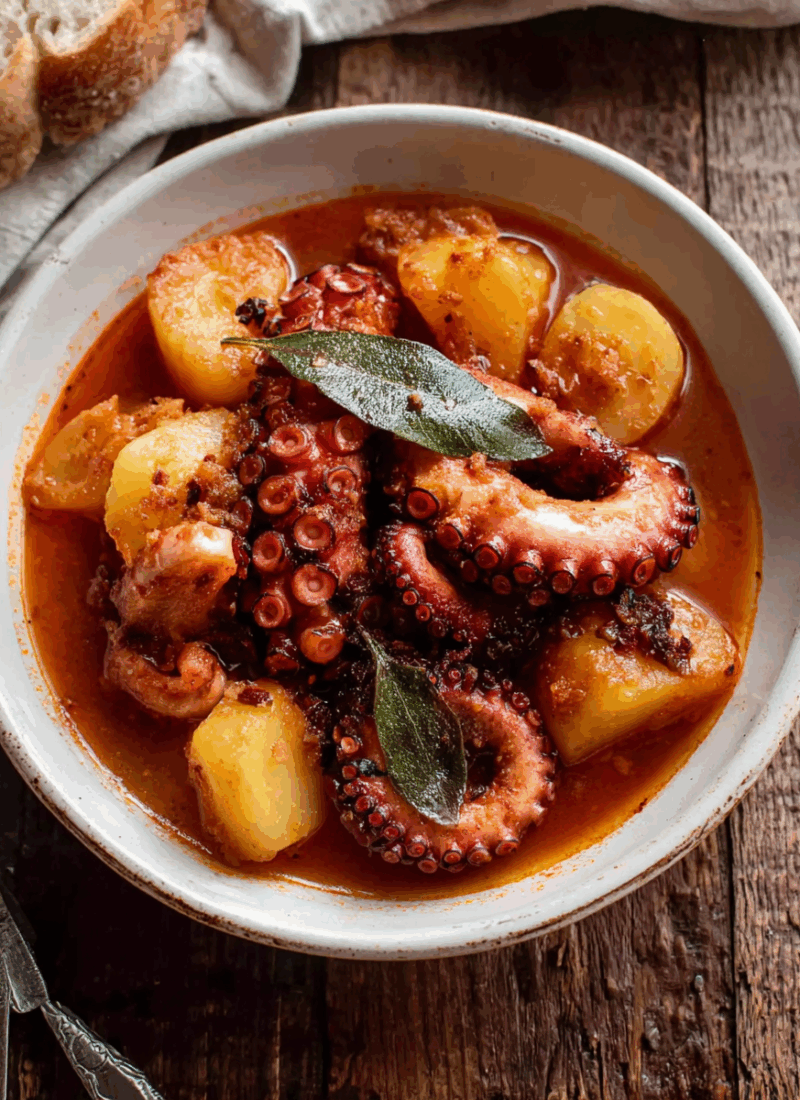This Greek Octopus Stew is a simple yet flavorful dish made with tender octopus, potatoes, and a rich tomato-wine sauce. Slow-cooked with minimal ingredients like onions, bay leaves, and extra virgin olive oil, it’s a perfect dish for bread-dipping. This dish is a beloved recipe from the Greek islands, known for its depth of flavor and comfort.
Full Recipe:
Ingredients
-
1.5 – 2 kg (3.3 – 4.4 lbs) octopus
-
800 grams (1.7 lbs) potatoes, peeled and cut into 5 cm (2-inch) pieces
-
2 medium-sized onions, finely chopped
-
⅔ tablespoon tomato paste
-
150 ml sweet red wine
-
½ teaspoon ground pepper
-
1 bay leaf
-
12 tablespoons extra virgin olive oil
-
Freshly ground pepper to serve
Directions
-
Prepare the Octopus:
Cut the octopus into 5-6 cm (2-2⅓-inch) pieces. Slice the thinner parts of the legs into longer pieces about 10 cm (4-inch) and discard the eyes and teeth. Rinse under cold water. -
Cook the Octopus:
Place the octopus in a medium-sized cooking pot. Add onions, bay leaf, wine, and 600 ml of water. Bring to a boil, then lower the heat to medium. Partially cover the pot and simmer for about an hour until the octopus is tender. -
Add Potatoes and Sauce:
Add tomato paste, pepper, olive oil, and potatoes to the pot. Stir gently and reduce the heat to medium-low. Simmer for 30-40 minutes, shaking the pot occasionally, and stir the bottom to prevent sticking. -
Rest:
Let the stew sit for 20 minutes before serving. -
Serve:
Serve with freshly ground pepper on top and enjoy!
Nutrients
-
Calories: 583 kcal
-
Carbohydrates: 42g
-
Protein: 5g
-
Fat: 42g
-
Saturated Fat: 6g
-
Polyunsaturated Fat: 5g
-
Monounsaturated Fat: 31g
-
Cholesterol: 0.2mg
-
Sodium: 39mg
-
Potassium: 1003mg
-
Fiber: 6g
-
Sugar: 4g
-
Vitamin A: 50 IU
-
Vitamin C: 44mg
-
Calcium: 43mg
-
Iron: 2mg
Why Octopus? The Star of the Stew
Octopus is a delicacy in many Mediterranean countries, particularly in Greece. Known for its delicate texture and mild flavor, octopus is the perfect protein for slow-cooking dishes like this stew. The slow cooking process helps break down the octopus’s tough fibers, resulting in a tender, melt-in-your-mouth texture that absorbs the flavors of the tomato-wine sauce beautifully.
Despite being a commonly found seafood, octopus often gets a reputation for being tricky to cook. However, in this recipe, slow simmering allows the octopus to become soft and flavorful without requiring extensive prep or skill. The natural brininess of octopus pairs wonderfully with the rich, slightly sweet wine and tomato sauce, making it an essential component of this Greek stew.
The Simple, Flavorful Sauce
The sauce in Greek Octopus Stew is one of its defining features. Made with just a handful of ingredients—tomato paste, red wine, olive oil, and a dash of pepper—this sauce is a testament to the beauty of simple cooking. The addition of sweet red wine infuses the stew with a subtle richness, while the tomato paste contributes a deep umami flavor, balancing the sweetness of the wine. The bay leaf and onions elevate the sauce, bringing complexity and aromatic depth to the dish.
The olive oil used in this stew is another key player in the flavor profile. Extra virgin olive oil, with its fruity and peppery notes, adds richness and helps to enhance the flavors of the octopus and potatoes. The slow simmering process ensures that the octopus and potatoes absorb every drop of this flavorful sauce, resulting in a dish that’s aromatic, savory, and comforting.
The Role of Potatoes in Greek Octopus Stew
Potatoes are an essential part of this stew, providing both texture and substance to the dish. As the stew simmers, the potatoes soften and absorb the rich sauce, making them tender and flavorful. The combination of the octopus and potatoes creates a perfect balance, with the potatoes acting as a hearty base that complements the octopus perfectly.
The starch from the potatoes also helps thicken the stew, creating a velvety consistency that coats the ingredients beautifully. Each bite of potato, paired with the tender octopus and rich sauce, is a satisfying experience, and the potatoes themselves are deliciously infused with the flavors of the stew. The simplicity of potatoes in this dish is key—they’re not over-seasoned, allowing the flavors of the octopus and sauce to take center stage.
A Dish Made for Sharing
Greek Octopus Stew is a dish that embodies the spirit of Mediterranean dining: simple, communal, and full of flavor. Traditionally, Greek meals are enjoyed with family and friends, often accompanied by fresh bread for dipping into the sauce. The stew is a perfect centerpiece for a leisurely meal, where the rich flavors can be savored slowly and enjoyed with loved ones. The heartiness of the dish makes it an ideal option for gatherings, while the flavorful sauce ensures that everyone will enjoy each and every bite.
In Greek cuisine, bread is often used to scoop up the last of the flavorful sauces, and this stew is no exception. The sauce from the stew is perfect for dipping, making the meal even more enjoyable. The idea of sharing a meal like this, with bread in hand, is part of the experience and is one of the reasons why this dish is so beloved.
How to Prepare Octopus for Stew
Preparing the octopus for this Greek stew is relatively straightforward. Begin by cleaning the octopus, removing the eyes and teeth, and slicing it into manageable pieces. The octopus is then rinsed under cold water before being placed in the pot to cook.
The key to cooking octopus properly is to allow it to cook slowly. Simmering it in a pot with wine, onions, and bay leaves helps tenderize the meat and infuse it with flavor. It’s important to cook the octopus until it’s fork-tender, as this ensures that it absorbs all of the sauce’s flavors and reaches the ideal texture. While it may take a little patience to cook the octopus properly, the results are well worth the wait.
Cooking Process: Slow and Steady Wins the Race
The process of making Greek Octopus Stew is all about slow cooking. After preparing the octopus and vegetables, the stew is simmered over medium heat for about an hour to cook the octopus to perfection. Then, the potatoes and tomato paste are added, and the stew is left to simmer further for another 30-40 minutes. This method of slow cooking allows the ingredients to break down and absorb the rich flavors of the sauce.
The simplicity of this cooking method makes the dish easy to prepare, but the key to its success lies in the time and attention given to the simmering process. The longer the stew cooks, the more the flavors develop, resulting in a rich, hearty meal that is both flavorful and comforting.
Serving and Garnishing Greek Octopus Stew
Once the stew is finished cooking, it should be allowed to rest for about 20 minutes before serving. This allows the flavors to settle and ensures that the stew is at the perfect temperature when served. When serving, the stew can be garnished with freshly ground pepper, adding a slight kick to the dish.
Greek Octopus Stew is typically served as a main course, accompanied by crusty bread for dipping into the flavorful sauce. A side salad of fresh greens or a Greek salad with feta and olives is also a great addition to balance the richness of the stew. Pair the meal with a glass of Greek wine or a crisp white wine to complete the experience.
The Nutritional Value of Greek Octopus Stew
Greek Octopus Stew is a hearty, wholesome meal that provides a range of nutritional benefits. With octopus as the main protein source, it’s low in fat and high in protein, making it an excellent choice for those looking for a lean source of protein. The potatoes add fiber and carbohydrates, providing energy and helping to balance the richness of the stew.
The dish is also rich in essential vitamins and minerals, including vitamin C from the potatoes and onions, as well as potassium and iron. The extra virgin olive oil contributes healthy monounsaturated fats, which are beneficial for heart health. Overall, Greek Octopus Stew is a nutritious and balanced dish that’s perfect for a comforting and satisfying meal.
Conclusion
Greek Octopus Stew is a dish that exemplifies the essence of Mediterranean cuisine: simple, flavorful, and made with love. With its tender octopus, hearty potatoes, and rich tomato-wine sauce, this stew offers a comforting and deeply satisfying meal. The slow-cooked nature of the dish allows the ingredients to come together beautifully, creating a meal that is perfect for sharing with family and friends.
Whether you’re looking for a new recipe to try or seeking to explore the flavors of Greek cuisine, Greek Octopus Stew is sure to impress. The combination of fresh ingredients and slow cooking results in a dish that’s both nourishing and full of flavor, making it the perfect addition to any dinner table.








